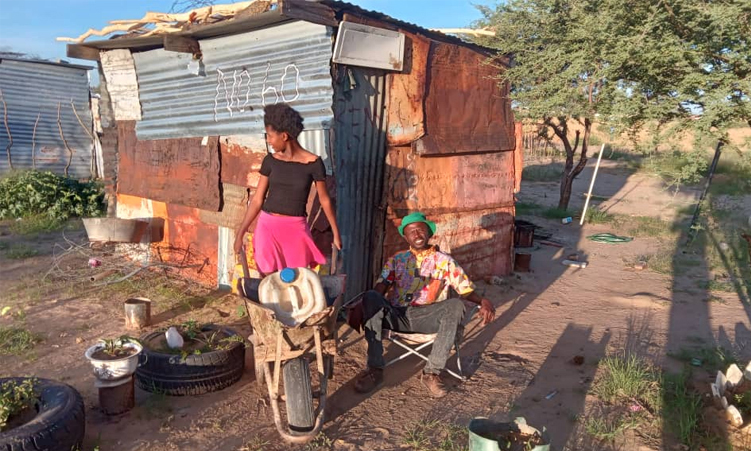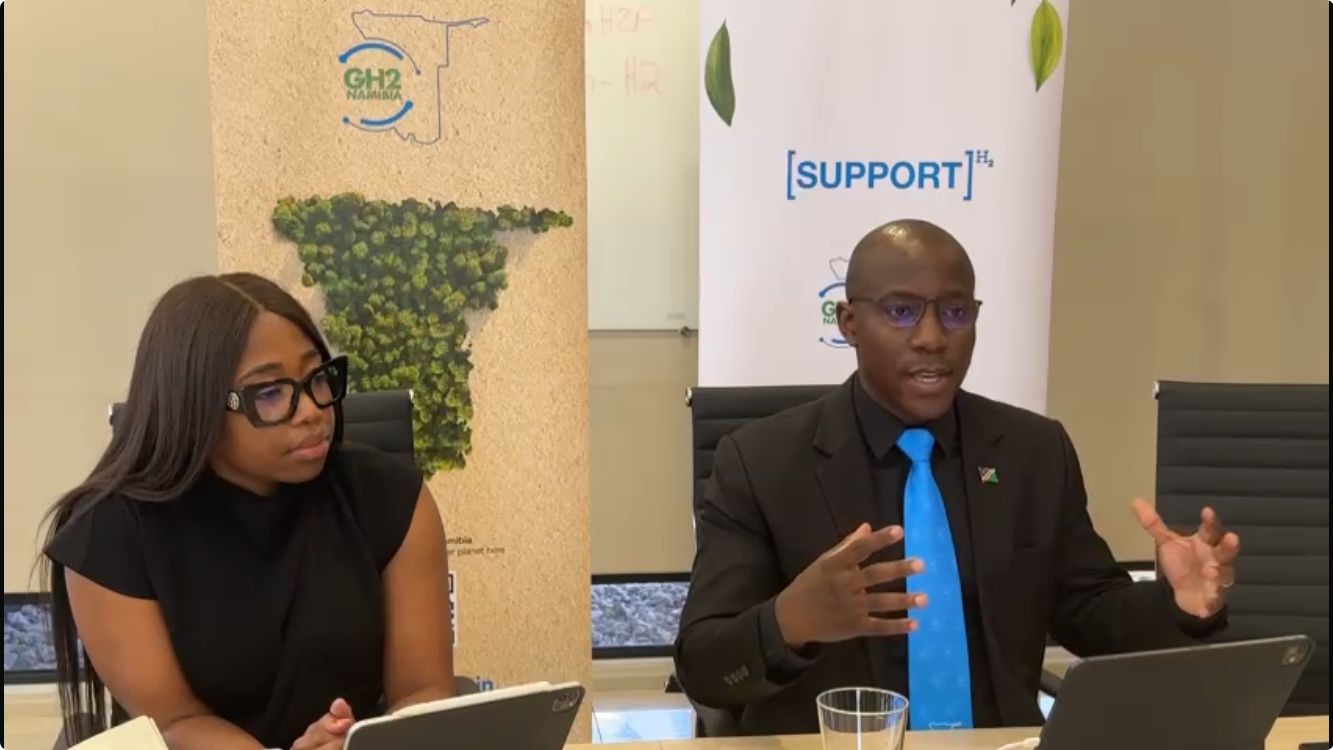President Hage Gottfried Geingob was truly a jack of all trades.
Besides his well-documented love for sport, football in particular, the older generation of Nomtsoub location at Tsumeb, where Geingob lived before he went into exile in 1962, also came to know Geingob as someone who had a special place in his heart for music.
A former pupil of Geingob’s at the Rynse Inboorling Skool in the early 60s describes the former Namibian president as someone who loved singing.
“What people are seeing, our late president dancing and singing today, is nothing. That is also the legacy he left with us, his former pupils at Tsumeb and his peers with whom he trained and played football during weekends,” says Manuel Uiseb.
“From what I have made up about my former teacher, is that he must have been a composer because he taught us a song that I have never heard being sung by other people after he left the country, apart from the pupils of Tsumeb that he taught the song.”
Uiseb, a retired teacher, choir leader and songwriter, says Geingob only taught them that one song, titled ‘!Khub /Kha !Gu !Gasatse’ (Khoekhoegowab for ‘Go With God My Brother’).
Little did the pupils know, he was indirectly telling them of his own departure.
“The last time we sang the song was during the school’s Christmas play in December and the next year, when schools re-opened, both Geingob and Paul Kalenge, his close friend and teammate at Etosha Lions, were not standing at their usual spots during the morning devotion.

“We were still in the lower primary those years and we didn’t even know the word exile. Even the political activities were only conducted at someone’s house at night. We didn’t even know who the leaders of Swapo were in Tsumeb at the time,” Uiseb says.
The translated lyrics of the song are: “Go with God my brother. Until we recognise you again, go with your guardian angel that will protect you from all evil. Go well, dear brother. Don’t forget to pray. Gotty Hage (x2). Only think about your return home.”
Looking at the words, it is clear that Geingob had planned his departure well ahead, even preparing his pupils for his absence, and that he was certain of returning back home one day.
It so happened that Geingob returned to his motherland and, ironically enough, he was the one assigned by the Swapo politburo to return back first and to kick-start the party’s election campaign with his concept of ‘star rallies’.
Needless to say, he was always surrounded by music and musicians and, as expected, he was an ever-present figure alongside the likes of South Africa’s Brenda Fassie, Lucky Dube and Lazarus Kakgadi, who have all since died, at Independence Arena in Katutura.
He also had his isolated meetings with the original members of the Ugly Creatures, especially during his years of political isolation, when he drew close to the band members. There was even a proposal that they perform at his 50th birthday party.
“However, things didn’t work out according to plan because that is when he got the top job in the United States. He wanted us to play our own songs and the Mbaqanga songs only,” Helois //Hoabeb, a band member of the Uglies, says.
The late president also turned out to be very comfortable with a microphone in his hand, and he just loved to sing the Miriam Makeba golden oldie ‘Malaika’ in front of an enthusiastic audience.

Ndilimani Cultural Troupe technical manager Joseph Gabriel, commonly known as ‘Tate Matangara’, describes Geingob as a “straightforward” person, highlighting that Geingob was always delighted to feature on Ndilimani’s projects when invited.
“Being a sound engineer in the music industry, I never thought I would meet the president in person, but our late president was such a free man,” Gabriel says.
“Several years ago, I recall working with the late Arafath Muhure on president Geingob’s campaign album. We had an appointment with the president, and he arrived promptly, without any hesitation,” he adds.
According to Gabriel, president Geingob had a distinct ear for music and had specific preferences about how he wanted his music to sound.
“I recall once when we recorded a song for him in his absence, he was not satisfied with how it sounded when he eventually heard it and he immediately asked for it to be rearranged,” Gabriel says.
Furthermore, Gabriel says Ndilimani’s relationship with Geingob spans many years, from when Geingob would advise them on how to make their music sound appealing to the masses.
Gabriel says Ndilimani will fondly remember the late president for his easygoing, friendly and caring nature, highlighting how closely they related to Geingob.
“He was like a father to us, we will dearly miss him,” he says.
“Though we have already put out a song as Ndilimani, we wish to extend our heartfelt condolences to the former first lady, madam Monica Geingos, the children and the entire Namibian nation.
“The death of president Geingob came as a shock to all of us and we are all equally touched. May his gentle soul rest in eternal peace,” Gabriel says.

Ndilimani lead singer Ileni ‘Castro’ Masamba describes president Geingob as “a true comrade”.
He recalls conversations about music that they had in the past, highlighting that Geingob was a father figure to him.
“We would sit and have coffee while chatting about music, I will miss those days,” Castro says.
Echoing Gabriel’s sentiments, Castro highlights that Geingob had a distinctive ear for music and had very firm music preferences.
“He knew music so well, sometimes he would show up for our rehearsal sessions and give us directives before performing at rallies or events,” Castro recalls.
He says it was always a delight to work with Geingob, which was “a once in a lifetime opportunity”.
“We stand with the former first lady and the entire nation during this dark moment, we know that nobody can fill the void left by president Geingob but we have to be strong.”
Geingob’s love for music didn’t have any boundaries. He continued attending music shows and festivals like the jazz festival and Kora Awards, of which he was the patron.
In fact, the last Windhoek Jazz Festival he attended was headlined by the South African-born internationally acclaimed Jonathan Butler in Windhoek last year.
Geingob was also a self-confessed fan of the South African jazz superstar Hugh Masekela and his compatriot Makeba, with ‘Malaika’ being his all-time favourite song.
Another artist who seems to have captured the imagination of the late president is Namibian singer, composer, conductor and songwriter Esme ‘Songbird’ Katjikuru, who sings jazz, gospel, blues and soul.
Says Katjikuru: “The first time the late president Geingob saw me performing was at the retirement function of bishop emeritus Zephania Kameeta at the Ephesians Congregation in Katutura. He was absolutely captivated by my voice.
“The next day, I received a call from State House inviting me to perform at a SADC presidential function. He saw me performing with the Ugly Creatures at the jazz festival and the following day, another call from State House looking for the lady who was wearing a yellow jacket.”
From there on, she was frequently invited to sing at official and private functions like birthday parties, and the last time she performed for Geingob was after he returned from a heart procedure in South Africa in June last year.
Geingob’s appreciation for music endeared him to artists and music lovers alike, and his support for local talent and presence at music events inspired and encouraged the growth of Namibia’s music industry.
Stay informed with The Namibian – your source for credible journalism. Get in-depth reporting and opinions for
only N$85 a month. Invest in journalism, invest in democracy –
Subscribe Now!






